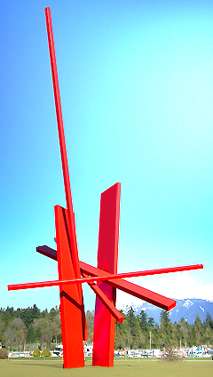John Raymond Henry
John Raymond Henry (born 1943) is an internationally renowned sculptor.[1] Since 1971, Henry has produced many monumental and large-scaled works of art for museums, cities and public institutions across the United States, Europe, and Asia. He has created some of the largest contemporary metal sculpture (90 to 100 feet (27 to 30 m) high) in the United States, and his sculpture is designed, engineered, fabricated, and erected by his own studio in Chattanooga, Tennessee.

Henry's sculpture has been described as huge welded steel drawings. He arranges linear and rectilinear elements that appear to defy gravity and float. Many suggest a moment of arrested motion where flying or tumbling elements are frozen. There is a simple elegance and an unexpected sense of immediacy and lightness in his work.
Henry was a founding member of ConStruct, an artist-owned gallery that promoted and organized large-scale sculpture exhibitions throughout the United States. Other founding members include Mark di Suvero, Kenneth Snelson, Lyman Kipp, and Charles Ginnever. Henry continues to curate exhibitions in the United States and in Europe, drawing on his nationally recognized expertise regarding sculptors and their work. He was also Chairman Emeritus of the International Sculpture Center and on the board of YoungArts in Miami for 25+ years.
Education/Distinctions
He was born in Lexington, Kentucky, USA in 1943. He received his BFA from School of the Art Institute of Chicago in 1969.
From 1978 through 1980 he was President/Chairman of ConStruct.[2] He received an Honorary Doctor of Arts from University of Kentucky in 1996. From 2001 through 2002 he was Chairman of the International Sculpture Center.
Recognition
- 2003 Kentucky Governor's National Award.
- 2004 Mayor’s Award of Distinction in the Arts in City of Chattanooga.
In 2005 a block of Cermak Road in Chicago was honorarily named John Henry Way by the City of Chicago.
Monumental Sculptures and Public Works
United States
District of Columbia
- Shafts, 1974, Smithsonian American Art Museum, Washington, DC
- Sloping Shafts, 1974, Smithsonian American Art Museum, Washington
- Three Bolts, 1974, Smithsonian American Art Museum, Washington
Florida
- Alachua, 1987, Marston Science Library, Computer Science and Engineering Building, University of Florida, Gainesville
- Blue Storm, 1993, The Sculpture Park at Florida International University, Miami
- Bonefish, 1988, Boca Raton Museum of Art, Art School Sculpture Garden, Boca Raton
- Hudson, 1986, Polk Museum of Art, Lakeland, Florida
- Journey To The Mountain Shire, 1989, Engineering Complex, Florida State Univ., Tallahassee
- Mattathias's Legacy, 1987, Temple Beth Am, Administrative Office, Miami
- Paciencia, 1981, South Miami (Metrorail station), Miami
- Reef, Florida Atlantic University, Boca Raton
- Rocher du Diamant, 1980, The Sculpture Park at Florida International University, Miami
- Sun Target #1, 1974, University of Central Florida, Orlando
- Untitled, 1982, The Sculpture Park at Florida International University, Miami
- Untitled, 1988, Grove Isle Yacht Club, Coconut Grove
- Untitled, 1994, American Bankers Insurance Group, Miami
- Wandering Spirit, 2000, Gulf Coast Museum of Art, Pinewood Cultural Park, Largo
Georgia
- Domaine, 1994, Robert T. Webb Sculpture Garden, Creative Arts Guild, Dalton
Illinois
- Arris, 1975, Amalgamated Trust and Savings Bank, Chicago
- Boom for Mark, 1979, 101 North Wacker Building, Chicago
- Bridgeport, 1984, Illinois State of Illinois Center, Chicago
- Chevron, 2007, Lakefront, 2045 N Lincoln Park West, Chicago
- Cloister II, 1997, Art Enterprises Limited, Chicago
- Ann Arbor, 1979, Ravinia Festival, Highland Park
- Untitled, Kottemann, George, Dr. & Mrs., Peoria
- Cape Variations, 1973, Beattie Park, Rockford
- Illinois Landscapes No. 5, 1976, Governors State University, University Park
Indiana
- Star Pointer, Purdue University - North Central, Westville
Iowa
- Sioux City, 1978, Sioux City
- Ice Blue, 2002, Iowa State University, Ames
Michigan
- Untitled, 1973, Grand Rapids Art Museum, Grand Rapids
- CUB 5/40, 1979, Grand Rapids Art Museum, Grand Rapids
Missouri
- Sun Target #2, 1974, City Art Museum, Springfield
- Treemonisha, 2008, Lafayette Ave at Truman Pkwy, St. Louis
Nebraska
- Ice Blue, Lincoln Plating, Lincoln
- Wake Dance, C.Y. Thompson Library, UNL, Lincoln
- Cape II, 1971, Pacesetter Corporation, Omaha
- Untitled 1980, Joslyn Art Museum,Omaha
New Jersey
- Reclining Refuge, 2002, Grounds For Sculpture, Hamilton, New Jersey, Hamilton
- East Chicago A Modern Monumental Sculpture, 1977, Par-Troy Associates, Parsippany
- Grande Rouge, 1998, Grounds For Sculpture, Hamilton
New York
- Aqua Viva, 1997 United Capital Corporation, Great Neck
North Carolina
- Sun Target #1, 1974, University of North Carolina, Charlotte, North Carolina
Pennsylvania
- Pittsburgh, 1977, Frank Curto Park, Pittsburgh
Tennessee
- Largo, 1981, Hunter Museum of Art, Chattanooga, Tennessee
- Untitled (BRS 80-28), 1980, Hunter Museum of Art, Chattanooga
- Precipice Star, River Gallery Sculpture Garden, Chattanooga
Texas
- Clarencetown Light, 1971, Dallas Museum of Art, Dallas
Utah
- Le Mont Rouge, 2004, Red Butte Garden, Salt Lake City, Utah
Wisconsin
References
- Barnes, Valerie (10 December 1978). "Sculpture: A Listing; For Morris County". New York Times. Retrieved 18 April 2011.
The sculpture, 69 feet long by 24 feet high, was executed by John Raymond Henry.
- Staff (2013). "John Henry- Monumental Metal Sculptures". SculptureSite.com (A New Leaf Gallery). Retrieved 18 February 2013.
| Wikimedia Commons has media related to John Raymond Henry. |